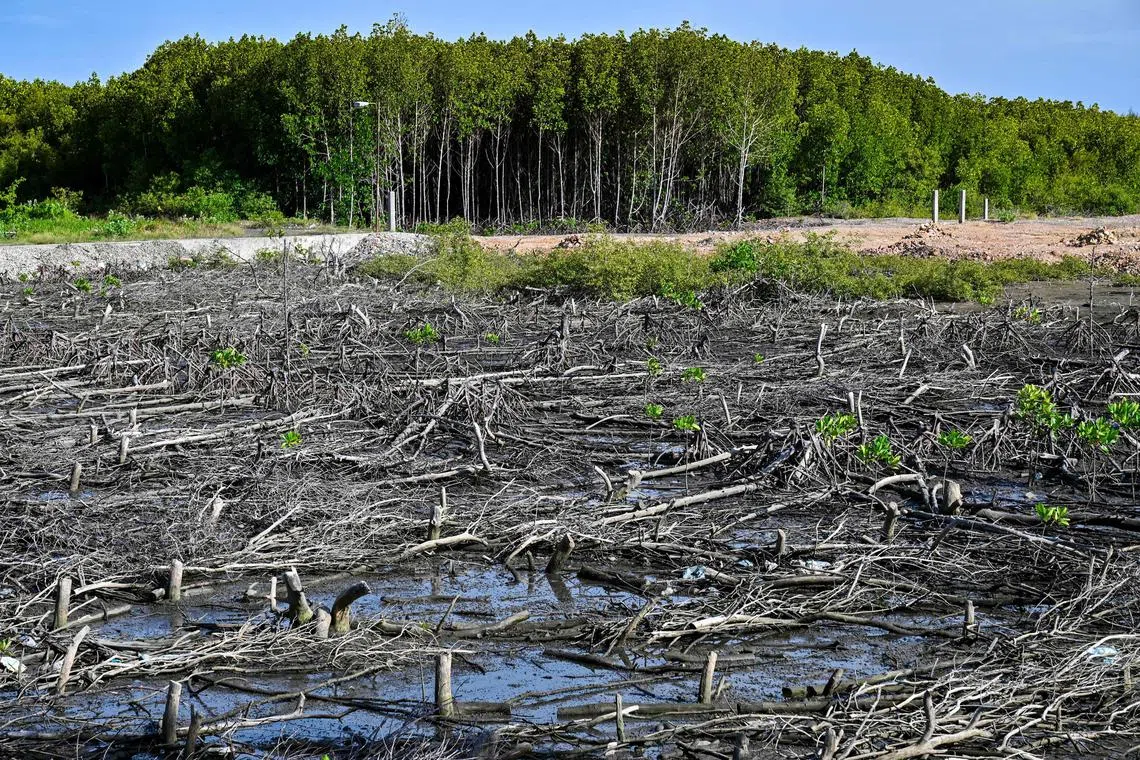Indonesia taps global climate advisory firm to explore nature-based project opportunities
Sign up now: Get ST's newsletters delivered to your inbox

Some 58 per cent of forests in the Asia-Pacific are under threat and could be protected as economically viable forest carbon projects.
PHOTO: AFP
SINGAPORE - Indonesia’s sovereign wealth fund, the Indonesia Investment Authority (INA), has teamed up with global climate change advisory and investment firm Pollination to explore nature-based solution investments, as Indonesia seeks to ramp up carbon credit trading.
In a joint statement on Wednesday, they said they had signed a memorandum of understanding (MOU) to identify investment opportunities and to develop nature-based projects, which aim to conserve, protect and restore vital ecosystems such as rainforests, peatlands and mangroves.
Such investments not only help absorb or lock away large amounts of carbon dioxide (CO2), the main greenhouse gas, but also protect a rich variety of tree and animal species and improve local livelihoods.
Carbon offsets from these projects can be sold to buyers looking to reduce their emissions, in a trade that is estimated to be worth billions of dollars in the future. Each offset represents a tonne of CO2 removed from the air or prevented from being emitted, such as when a forest is saved from being chopped down.
Investors and governments are increasingly interested in these projects because they could be a source of offsets to meet emissions reduction targets. Singapore has ambitious plans to further develop the Republic as a global carbon trading hub,
“With INA’s focused approach to green energy and transformation, coupled with Pollination’s profound expertise in climate change solutions, we see a tangible pathway to generate meaningful carbon credits and foster nature-based investments,” INA chief executive Ridha Wirakusumah said in the statement.
Pollination chief executive Martijn Wilder said: “Reaching net-zero global emissions as quickly as we need to will require the opportunities presented by nature-based solutions to be maximised.”
He added: “Our goal is not only to attract global investment, but also to assist Indonesia in meeting its national targets.”
Pollination is in the process of setting up a regional office in Singapore.
According to the Centre for Nature-based Climate Solutions (CNCS) at the National University of Singapore, 58 per cent of forests in the Asia-Pacific are under threat and could be protected as economically viable forest carbon projects.
CNCS research shows that the Asia-Pacific region has the highest concentration of the most profitable carbon projects, which can generate returns on investment at close to US$25 billion (S$33.7 billion) per year and also achieve deep reductions of CO2 emissions.
The centre has developed a mapping tool to identify where natural ecosystems such as tropical forests and mangroves can be conserved and become potential sources of carbon credits.
The tool allows users to compare how many high-quality carbon credits can be generated from different parts of the world. For example, it shows that Indonesia and Malaysia are among the best countries to avert carbon emissions by protecting their forests.
The MOU comes as Indonesia has been developing regulations that set guidelines for carbon trading in the forestry sector, as well as establishing a national registry for carbon projects. The country is set to launch a national carbon exchange in September.



